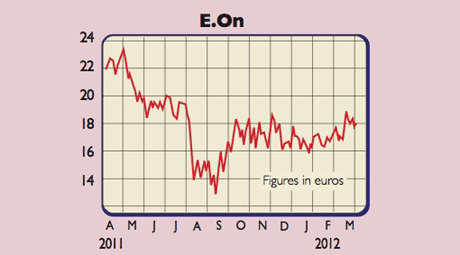Get the latest financial news, insights and expert analysis from our award-winning MoneyWeek team, to help you understand what really matters when it comes to your finances.
You are now subscribed
Your newsletter sign-up was successful
Want to add more newsletters?

Twice daily
MoneyWeek
Get the latest financial news, insights and expert analysis from our award-winning MoneyWeek team, to help you understand what really matters when it comes to your finances.

Four times a week
Look After My Bills
Sign up to our free money-saving newsletter, filled with the latest news and expert advice to help you find the best tips and deals for managing your bills. Start saving today!
The UK and Germany are facing the threat of an energy crunch by 2020. After last year's Fukushima accident, both countries are finding it harder to attract the inward investment into their electricity grids needed to replace the old nuclear/coal capacity that is being decommissioned over the coming years.
Energy firm E.On has already taken a €2.5bn charge in 2011 for the immediate shutdown of eight out of Germany's 17 nuclear power stations together plus a €1bn tax grab. So the near-term picture is tough for the group.
But this is already more than factored into the downtrodden valuation, which reached €50 only four years ago. Further out, any shortage in electricity in its two biggest markets should enable better margins to be earned from its portfolio of existing gas, renewable, coal and oil assets.
MoneyWeek
Subscribe to MoneyWeek today and get your first six magazine issues absolutely FREE

Sign up to Money Morning
Don't miss the latest investment and personal finances news, market analysis, plus money-saving tips with our free twice-daily newsletter
Don't miss the latest investment and personal finances news, market analysis, plus money-saving tips with our free twice-daily newsletter
Better still, the firm has recently renegotiated its loss-making gas supply contracts with Norway's Statoil, and plans soon to do the same with Russia's Gazprom. And to counter the effects of Germany's stifling energy policy, E.On is expanding overseas.
It has signed a joint venture to run power plants in Brazil, and is talking to several local companies about entering India and Turkey. This was "a first important step", said CEO Johannes Teyssen, towards jump-starting the company's existing non-European operations onshore wind in the US and gas-fired power stations in Russia.
Elsewhere, E.On's cost-cutting plans are in full flow with the target of shedding 11,000 employees from its 80,000 headcount to help produce annual savings of €1.5bn. And in order to improve the balance sheet €5.5bn of disposals have been slated over the next two years.
E.On Ag (Xetra Dax: EOAN), rated OUTPERFORM by Exane BNP Paribas

So, overall, Teyssen is optimistic and reckons 2011 will prove a low watermark with earnings set to rise 10% per year until 2015. For 2012 he expects EBITDA of between €9.6bnto €10.2bn, moving up to €11.6bn to €12.3bn by 2013 alongside a progressive dividend of €1.10, offering a juicy 6% yield.
On this basis, I rate E.On on an eight times EBITDA multiple. Adjusting for €18.4bn of non-interest bearing legacy liabilities and another €18bn in net debt delivers an intrinsic worth of roughly €22 a share.
There are some risks. E.On is exposed to volatile commodity markets. And as much of its infrastructure is regulated it is also exposed to political interference.
Nonetheless, Teyssen concludes that "stable earnings streams give us a strong foundation for running our business soundly even in difficult times, for successfully meeting future challenges, and for tapping new, profitable growth opportunities".
The AGM is scheduled for 3 May, and Exane BNP Paribas has a price target of €22.50.
Rating: BUY at €18.20 (market cap €34.5bn)
Paul Hill also writes a weekly share-tipping newsletter, Precision Guided Investments. See www.moneyweek.com/PGI , or phone 020-7633 3634 for more.
Get the latest financial news, insights and expert analysis from our award-winning MoneyWeek team, to help you understand what really matters when it comes to your finances.
Paul gained a degree in electrical engineering and went on to qualify as a chartered management accountant. He has extensive corporate finance and investment experience and is a member of the Securities Institute.
Over the past 16 years Paul has held top-level financial management and M&A roles for blue-chip companies such as O2, GKN and Unilever. He is now director of his own capital investment and consultancy firm, PMH Capital Limited.
Paul is an expert at analysing companies in new, fast-growing markets, and is an extremely shrewd stock-picker.
-
 Should you buy an active ETF?
Should you buy an active ETF?ETFs are often mischaracterised as passive products, but they can be a convenient way to add active management to your portfolio
-
 Power up your pension before 5 April – easy ways to save before the tax year end
Power up your pension before 5 April – easy ways to save before the tax year endWith the end of the tax year looming, pension savers currently have a window to review and maximise what’s going into their retirement funds – we look at how